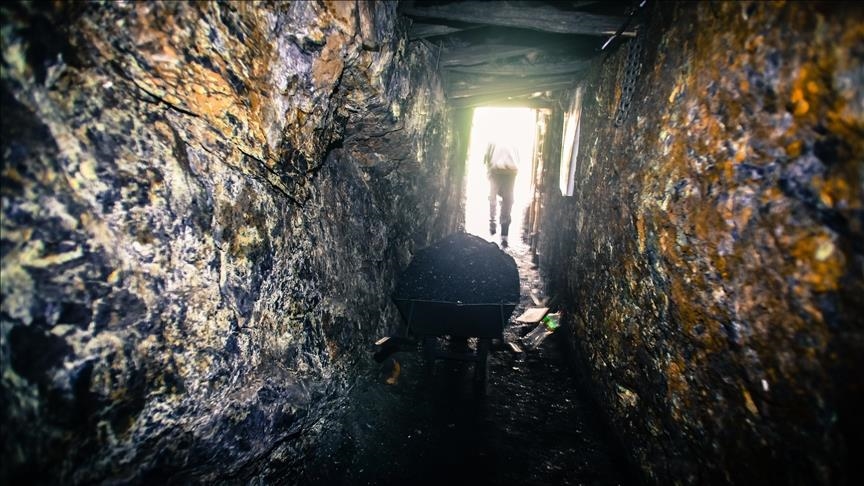Strike gold, reclaim power: Sahel’s resource nationalism rises
Military governments in Mali, Burkina Faso, and Niger are asserting greater control over their natural resources, taking back gold and other mines

- ‘The nationalization of resources is key to the narrative of the military-run Sahel countries ... take charge of their countries without what they call Western exploitation,’ says Ulf Laessing, head of the Konrad Adenauer Foundation’s Sahel program in Mali
ISTANBUL
In the heart of Africa’s Sahel region, military-led governments in Mali, Burkina Faso, and Niger are nationalizing gold mines in a bid to reclaim control over their mineral wealth.
The move is part of a broader wave of resource nationalism that has surged since a string of military coups swept the region.
For decades after independence, foreign companies and artisanal miners dominated the mining sectors of the three countries. Limited infrastructure, weak capital bases, and neoliberal policies left governments on the sidelines, unable to compete.
But with the rise of military juntas, the tide has turned, and national sovereignty is now central to economic policy.
Between 2020 and 2023, coups toppled civilian leaders in Mali, Burkina Faso, and Niger. In September 2023, the trio formed the Alliance of Sahel States (AES) and formally exited the Economic Community of West African States (ECOWAS) in January 2025, triggering a six-month negotiation window set to expire on July 29.
“The nationalization of resources is key to the narrative of the military-run Sahel countries – that they take charge of their countries without what they call Western exploitation,” said Ulf Laessing, head of the Konrad Adenauer Foundation’s Sahel program based in Mali.
He said there is a widespread belief that “Western nations have profited too much” from the region’s resources.
According to the World Gold Council, Mali was Africa’s second-largest and the world’s 11th-largest gold producer in 2024, with 100 tons, followed by Burkina Faso with 94.4 tons.
Niger produced 33.6 tons of gold and ranked seventh globally in uranium production, with 2,020 tons, according to the World Nuclear Association’s 2022 report.
Gold plays a smaller role in Niger compared to its uranium reserves, where informal mining dominates, and its nationalization strategy has focused more on uranium than gold.
Foreign firms pushed aside as states step in
The shift toward sovereignty has coincided with new geopolitical alignments. “The new partnerships with Russia, but also China and Türkiye, have given the Sahel countries more self-confidence to end dependence on Europe,” said Laessing. “The Sahel now has more options to do business with.”
In Mali, gold mining was long dominated by major foreign players, including South Africa’s AngloGold Ashanti, Canadian firms Iamgold and B2Gold, Australia’s Resolute Mining, and Randgold – a London-listed company that later merged with Canada’s Barrick Gold.
Next door in Burkina Faso, chief among the international companies were Canadian firms Iamgold and Semafo, which later merged with the London-listed Endeavour Mining, along with Russia’s Nordgold and Australia’s West African Resources.
In Niger, the mining landscape featured Morocco-headquartered firm Societe des Mines du Liptako, operating with Canadian partners, alongside Canada’s GoviEx Uranium and China’s Zijin Mining, with activity spanning both gold and uranium extraction.
Mali has introduced a mining code requiring up to 35% state ownership, nationalized key operations such as B2Gold’s Fekola mine, the Yatela mine, and the Morila mine, while also seizing gold from Barrick Gold’s Loulo-Gounkoto complex.
Barrick responded with a lawsuit in December 2024, filing for arbitration at the International Center for Settlement of Investment Disputes.
Laessing warned that such moves could scare off other investors.
Burkina Faso has followed suit, revising its mining code to boost local ownership, opening its first national gold refinery, and nationalizing five licenses and major mines like Boungou and Wahgnion. These assets were reportedly acquired below market value through the state-run Societe de Participation Miniere du Burkina (SOPAMIB).
In Niger, nationalization efforts have focused on uranium. The government revoked French company Orano’s license and took full control of the Somair mine. Gold remains largely untouched for now, though state-led exploration has expanded through Compagnie Miniere de l’Air (Cominair SA).
Security risks, investor hesitation, and informal mining
Nationalization coincides with a deepening security crisis across the Sahel. Armed groups have taken advantage of governance vacuums to control and tax informal gold sites, especially in Burkina Faso and northern Mali.
According to Laessing, informal gold mining has become the largest employer in the region, spurring growth of local communities, and he warned that authorities “will struggle to fully control these sites.”
In Burkina Faso, around 40% of the territory is outside government control, he explained, with armed groups levying taxes on gold miners and using the funds to finance operations.
Mali and Niger face similar challenges with insurgent groups and fragmented state control.
“A worsening security situation across the Sahel, and more assertive and nationalist policies will make it difficult to attract fresh foreign interest,” said Laessing.
He noted that the Sahel’s militaries are seeking new revenue as Western donor support dries up. Gold prices have surged due to global uncertainty, making the stakes even higher.
Despite the push for self-reliance, Laessing was skeptical of the region’s ability to independently manage large-scale mines.
Russian miner Nordgold is active in Burkina Faso, but more complex mines like Barrick’s in Mali may be beyond their capacity, he said.
China, he added, already plays a role in Mali’s emerging lithium sector and could deepen its footprint through partnerships with state firms.
Still, security and political instability may deter new foreign investment.
“If security and government control throughout the Sahel remains weak, it will be difficult to exploit resources better than before,” Laessing warned.
Anadolu Agency website contains only a portion of the news stories offered to subscribers in the AA News Broadcasting System (HAS), and in summarized form. Please contact us for subscription options.

